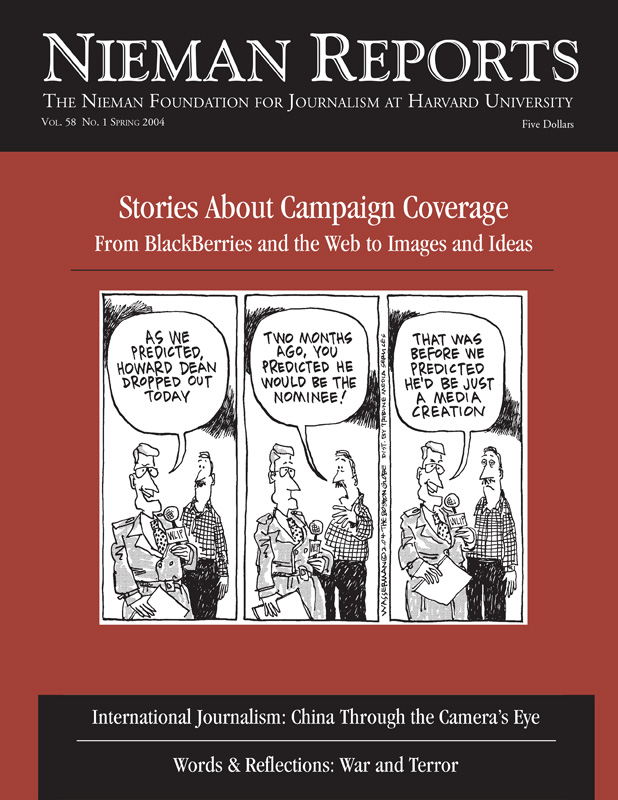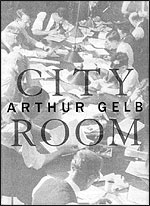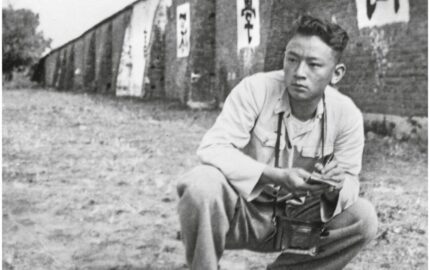
 City Room
City Room
Arthur Gelb
G.P. Putnam’s Sons. 664 Pages. $29.95.First, disclosure: I worked for Arthur Gelb on the metropolitan desk of The New York Times for a little over a year in the early 1960’s. I liked Arthur but not my job. Second, for nearly a decade I was the news editor of the Times’s Washington bureau, which Arthur singles out for harsh criticism in this recounting of his 45-year love affair with the former gray lady of 43rd Street. However, I am not mentioned in this memoir, a fact that Nieman Reports believes qualifies me, at least from the standpoint of reasonable purity, to write this review.
“City Room” is an easy read. Anecdotes tumble over one another in the style now called narrative journalism, from the first day gangly 20-year-old Arthur Gelb set foot in the newsroom in 1944 to Abe Rosenthal’s wistful 80th birthday party in 2002. The tales pile up while the years roll on. As Arthur, the coruscating metropolitan editor, tells it, he and Abe, the brilliant managing editor, take over and make over the paper—well, most of the paper.
Only a hardened Rosenthal hater would doubt that the Times is a far better newspaper now than it was three decades ago. While the Federal Trade Commission could cite it for false advertising in its slogan, “All the News That’s Fit to Print,” it gives the reader, day in, day out, far more information than anyone can absorb. Old-timers grouse about the content of some of the weekday sections, but the additions have extended the Times’s reach in medicine, health, science, electronics and culture, as well as sports and entertainment. The clammy hand of rule-bound editors has been loosened, and good writing is encouraged throughout the paper. Artists, having taken control from the makeup editors, transform pages into attractive layouts that entice readers to stay with the paper long after the coffee has grown cold. Moreover, the staff charges out of the starting blocks much faster than in the old days.
Who gets credit for this giant leap forward? For Gelb, Rosenthal led the way. In his summing-up of his former boss, Gelb, although still hurt because he felt Rosenthal betrayed him, puts it this way: “It would be an egregious disservice not only to Abe, but to the history of American journalism, not to acknowledge his immense contribution to the evolution of contemporary newspaper writing and editing.”
In discussing the expansion of the paper, Gelb concedes that the business side, through Walter Mattson, a senior vice president (later president), and John Pomfret, assistant general manager (later general manager and executive vice president), eventually convinced Abe and him that the news department would not lose its independence if it cooperated with the advertising department in going to a four-section newspaper. The additional content, which, in this case, is a better word than “news,” increased circulation and advertising (with a timely assist from the economy) and thereby helped rescue the Times from the dire financial straits of the mid-1970’s. Gelb does not say who first proposed the four-section idea, but Mattson and Pomfret, who made the first move, were masters in human relations and likely talked the two editors into thinking they did. In any event, both sides contributed to the successful expansion. However, Gelb leaves no doubt that, in his mind, he deserves major credit because he developed the editorial concepts (he does not say that many ideas came from Mattson and Pomfret) and gave birth to the sections. Indeed, they are his legacy.
Rosenthal and Reston
Media watchers will not be surprised that Gelb joins the deconstructionists in maligning the once sainted James (Scotty) Reston, winner of two Pulitzer Prizes, who more than anyone brought thoughtful analysis to the news pages. After all, Reston worked for years to break up the Rosenthal-Gelb double helix. Many readers, however, will be startled by Gelb’s tarnishing of his sidekick Rosenthal. They had grown into journalistic Siamese twins. Often, Gelb writes, “I felt as though Abe and I were two halves of the same person.” No wonder, then, that Gelb, on tour in Venice in 1969, was shocked when Rosenthal called with the news that he was becoming managing editor and that Seymour Topping would be his assistant managing editor.
“My heart dropped,” Gelb recalls. “I couldn’t believe that Abe, with whom I had worked as closely as a brother since we started together on the metropolitan desk in 1963, would wait until the last possible moment to spring this news—first, that he was moving to the top, and, second, that he was not designating me as his deputy.
“‘Remember,’” Abe said in the phone call, “‘Scotty made you a pretty clear promise [of being Sunday editor], and I’m sure he’ll stand by it.’ I tried hard to accept Abe’s reassurance and consoled myself with the fact that I did, after all, still have the job I treasured as metropolitan editor. Nevertheless, I felt betrayed.”
Days later, in London, Abe explained that Scotty, then executive editor, had been “dead set” against Gelb’s appointment as assistant managing editor and “less than thrilled” that Abe was going to be managing editor. Later, Gelb says, he learned that Reston had unsuccessfully urged the publisher, Arthur Ochs (Punch) Sulzberger, to appoint Max Frankel, the Washington bureau chief, managing editor. “Scotty was still determined to break up Abe and me as a newsroom team, fearing we were too aggressive a combination and would try to impose our own overachieving style on the paper,” Gelb writes. “Separately we would be contained, Scotty evidently believed, but together we would be overwhelming.”
Three years later, Reston, although no longer executive editor, persuaded the publisher to name Frankel Sunday editor, despite his promise to Arthur. “I was angry, at what I saw as yet another double-cross, and I seriously considered leaving the paper,” Gelb writes. Wisely he stayed on as metropolitan editor.
Gelb recognizes Rosenthal’s explosive temper and also indicates that his pal eventually became jealous of him. In a revealing anecdote he tells of a dinner he and Abe had at the Algonquin Hotel with Joseph Papp, the Public Theatre director. Papp explained to Abe why he had dismissed his right-hand man. “Smart executives like you and me eventually have to learn about keeping anyone nipping at our heels too close to us,” Papp said, obviously referring to Abe’s refusal to insist on Gelb as his assistant managing editor. Gelb joined in the laughter but writes that “nonetheless the pain of the betrayal lingered.”
Yet Gelb, in situation after situation, sets aside his hurt to express a loyal preference for Rosenthal over Frankel, although the latter gave him the title of managing editor.
If there is a villain in this book, it is Scotty Reston. Abe and Scotty shared characteristics, Gelb says, as sons of struggling immigrant parents, with a strong love of the United States and the Times. “But while Scotty had aspired to blend in with smooth upper-class Washington, Abe had retained his unvarnished gutsy New York attitude. The two had tried to mask an ever-growing dislike for one another—and mostly managed to keep peace for the sake of the paper.” If an “unvarnished gutsy New York attitude” means dining day-after-day at Sardi’s and the Four Seasons with the beautiful people, literati and movers and shakers, which is what Abe and Arthur did, then it’s a step or two down in food and ambiance to dine with smooth Washington upper-class government officials and politicians at the staid Metropolitan Club in Washington, which Reston did. In both cases their dining companions were their friends, as well as their sources and the readers they most valued, all of which adds up to an elite journalism that raises troubling ethical questions on both sides.
Gelb sees Reston as deteriorating so badly when he moved to New York that he lost his news judgment. He mentions the story that Scotty, vacationing on Cape Cod, wrote on the death of Mary Jo Kopechne, the passenger in the car that Senator Edward Kennedy drove off a bridge at Chappaquiddick. It began, “Tragedy again struck the Kennedy family.” Rosenthal, Gelb says, gently insisted on a rewrite on the basis that the story concerned the death of a young woman by an influential senator. Reston complied but objected when Rosenthal said he was sending Joseph Lelyveld to follow the story, seeing it as simply a one-day story about a tragic accident.
Not the first to say so, Gelb calls Reston a failure as executive editor. “Scotty presided over meetings with his top desk editors like a pipe-puffing professor leading a seminar. At times he seemed shrouded in Presbyterian rectitude. Seated at the conference table straight-backed, he’d often stare into the middle distance, as if pondering the world’s destiny, puzzling over the grand scheme of things, talking about ‘finding America.’ He would make suggestions for coverage that were vague and abstract, more appropriate for an academic monthly magazine than a daily paper whose lifeblood was in hard news for the next day’s editions. Bewildered glances were exchanged among the editors, as all waited for Scotty to come to his point. He rarely did. While he had once been an inspired Washington correspondent, it was clear he didn’t have the instincts for running a complex daily operation like the Times.”
Perhaps Gelb does not understand what Reston, never a hands-on editor, was trying to do. By sitting at a desk in the middle of the newsroom instead of in his executive office, Reston was sending a message that he was the point man, available to all. He wanted that because in Washington he had often complained that Clifton Daniel, as managing editor, was not managing or editing the paper. Yet it could not have taken him long in New York to understand why each of his two predecessors, Turner Catledge and Daniel, decided to act as chairman of the board and not as chief executive officer. There was too much to do in both roles. The newsroom needed a vision of where it was going and a field general to take it there. Reston tried to provide the vision of a chairman while sitting in the chair of the CEO. Reston’s inability to do both jobs, while struggling unsuccessfully to continue his Washington column by phone, provided the opening for Rosenthal to dominate the newsroom by acting as CEO, thus clearing the way for his ultimate rise to the very top when Scotty returned to Washington 13 months later.
Although Gelb entitles his book “City Room,” its reach is wide enough to embrace the Pentagon Papers, Watergate and the Washington bureau in general. And his reach exceeds his grasp. He goes out of his way to denigrate the bureau, attributing its catchup response to the Watergate scandal to the risible idea that it lacked the phone number of the District of Columbia police. Actually, the bureau did quite well in mining the police department and prosecutor’s office. It was the lack of sources in the Nixon administration that hobbled the bureau’s coverage. Abe was “gnashing his teeth” as The Washington Post broke one story after another, Gelb said, adding: “At one point, he considered sending me to the bureau to head up the coverage … but I believed my going would be of little avail, because once a story as big and complicated as Watergate gets away from you, it’s virtually impossible to catch up.”
Abe told Arthur much later that not removing Frankel as head of the Washington bureau during Watergate was the greatest mistake of his career. Gelb does not say whether Abe suggested Frankel’s removal to the publisher. Fear of Reston and of a bureau uprising similar to the 1968 uproar over replacing Tom Wicker as bureau chief certainly were factors in holding Abe back.
Gelb touches lightly on the damage suffered by the staff under his and Rosenthal’s prodding. Throughout the book he refers to “my reporters” and “my staff,” even “my paper,” a disturbing frame of mind for a leader of equals, but then, perhaps, although he fondly remembers many of them, he does not consider the reporters his equals. Yet he speaks frankly, saying he can see why some reporters were “ambivalent about me.” And even more frankly, “I’m not at all sure I’d have wanted to work for me when I was an editor.” Rosenthal was even more difficult to work for. The two apparently were blind to the low morale in the newsroom. But the publisher, informed by Reston, was not. In his memoir Frankel says that when he succeeded Rosenthal as executive editor, Punch asked him to restore staff morale, which he did.
Failures on Some Stories
Gelb is justly proud of his career, but he seems oblivious to the ethical questions raised by his personal ties to the artistic crowd both as cultural news editor and as metropolitan editor. While he and Rosenthal deserve high praise for invigorating the Times’s coverage of local news, he neglects to explain some of the stories the metropolitan desk tripped up on during his watch. Here are examples from just two tests of their leadership:
The fiscal crisis of 1975, which suddenly brought New York City’s government to its knees: For the most part the Times was asleep, like the rest of the press, until the danger of bankruptcy became clear. The Times eventually did a good catch-up job, which was better than nothing but a poor substitute for the watchdog role it should have played in previous years. In the end, Gelb concedes, the Daily News headline on President Gerald Ford’s rejection of aid was the most powerful journalistic achievement of the crisis: “Ford to City: Drop Dead.”
The Blood Brothers stories of 1964: Gelb emphasizes the Times’s requirement for rigorous checking, but he fails to explain why he and Abe did not insist on multiple sourc-ing before running Junius Griffin’s reports that a gang of militant black youths was roaming Harlem streets seeking to kill whites. It is more than interesting that the exclusive stories remained exclusive. No other paper could discover the gang, leading some on the Times to doubt its existence. Gelb concedes that at times he harbored doubts. Twenty years later, in talking with Griffin, those doubts still bothered him, and he again asked the former reporter about the stories. Griffin, he said, “insisted that every fact in his stories had been true.” Gelb hedges his conclusion: “Overall I found Griffin’s sincerity convincing.”
The reader should be thankful that Gelb’s editor, Marian Wood, did not delete the anecdotes he had squirreled away because they shed so much light on the reporters who, in the end, were the key elements of the Times in those days—fun-loving Mike Berger, cynical Homer Bigart, dogged Peter Kihss, pert Edith Evans Asbury, influential Brooks Atkinson, giggly Craig Claiborne, astute Charlotte Curtis, relentless Nicholas Gage, stylish Gay Talese, poetic McCandlish Phillips, generous Irving (Pat) Spiegel, and many others. (Is it quibbling to ask how Gelb is able to recreate, decades after events, word-by-word conversations? Did he really find time after 16-hour workdays to jot down not just those stories, but also the exact words?)
Gelb even finds room in the last few pages to express dismay over the Times’s apology—four pages of “self flagellation”—for a young reporter’s fake stories that led to staff complaints about Howell Raines, the executive editor, who, with the managing editor, Gerald Boyd, had to resign. Gelb said he tried to alert Raines to the staffs grievances, but there were extenuating circumstances that absorbed his attention, including the terrorism story, the death of his mother and father and his marriage. If Gelb, who was certainly a moderating influence, had only alerted his buddy to the stress, anger, even terror that Rosenthal’s intense personal style created in the newsroom, would Abe have listened? Shock therapy would have been necessary, for Abe thought those who disagreed with him were less loyal to the paper.
Rosenthal and Gelb stand tall in the history of the Times. How much taller both would stand if Arthur had tried—and convinced—his friend to change his ways.
Robert Phelps is the retired editor of Nieman Reports. After leaving The New York Times, Phelps moved to The Boston Globe, from which he retired as excutive editor after 11 years.


